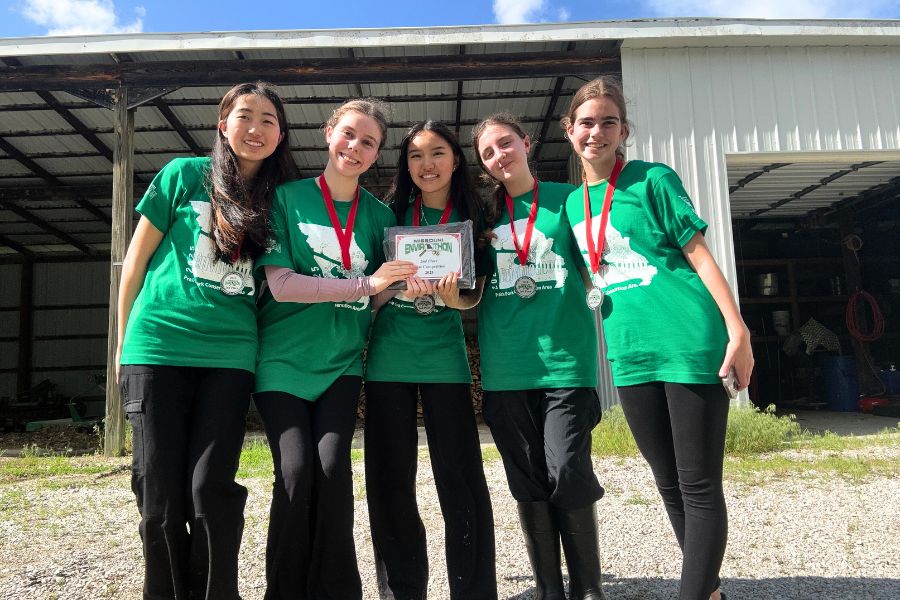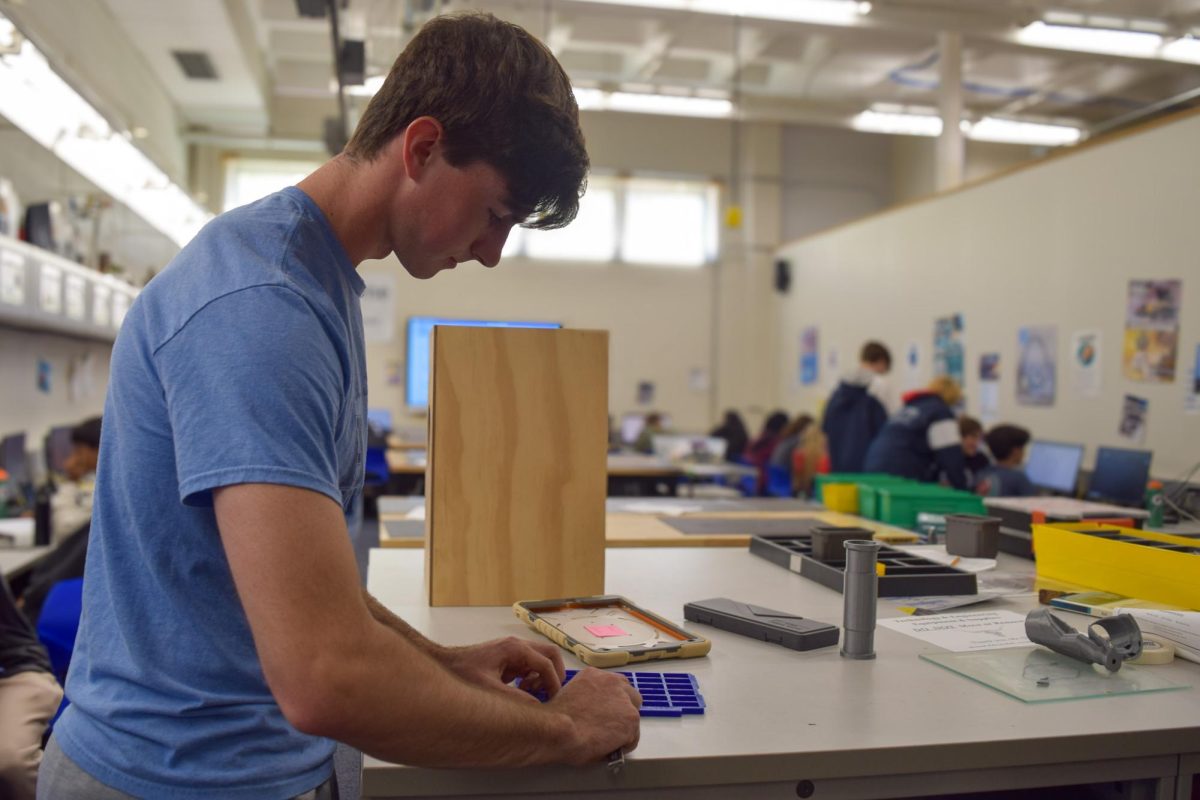As the magnitude of COVID-19 increases, alumnus Dr. James Forsen prepares, as many other healthcare professionals have, to battle a global pandemic.
From a young age, Forsen knew he wanted to be a doctor. To pursue his dream of becoming a healthcare provider, Forsen attended Princeton University and Washington University School of Medicine. Forsen is a pediatric ears, nose and throat doctor, and his job mainly consists of surgical operations on newborn children. Since the Stay Home Missouri Order went into effect, he has noticed a large decrease of patients coming in.
“I’m doing much fewer operations,” Forsen said. “It turns out that ears, nose and throat doctors are more at risk than most doctors because the virus is [located] in the nose and throat, so procedures that I do in my office, where I put a fiber optic scope into the nose, the back of the throat or the voice box, we’re doing much fewer of that. For surgeries, we are trying to not do those procedures unless it’s an emergency.”
Forsen’s work hours have decreased as more regulations have been put on the types of patients he is allowed to provide service to.
“[My hours] are dramatically reduced. I come into the hospital for at least a half day most days. Most of the days I spend in the operating room, I have nothing to do. A couple days, I didn’t come in at all,” Forsen said. “I’m frustrated because I’m used to working at least five days and I at least work 12 hours a day so I’m used to that. I like to do that and it’s tough when my days are not as full. I’m also a little frustrated because I have a number of patients that are waiting to have surgery and I can’t get to them yet.”
For the purpose of taking precautionary steps, Forsen wears personal protective equipment (PPE) at all times for when he is in the hospital. Forsen has not been treating COVID-19 patients, but it is likely that more health professionals will be needed as the number of cases increase.
“What [we were] doing, initially, was [that] the general staff that weren’t working directly with COVID-19 patients did not have to wear a mask. Now, it’s been highly recommended that everybody in the hospital, no matter what your interactions are, wear a mask,” Forsen said. “We wash our hands incredibly frequently. The mask that I’m wearing is a typical surgical mask, but I have a higher level mask called the N95, and that’s a mask that reduces smaller particles coming through. When I’m doing procedures with some patients that I think might be sick, I put on that N95 mask and wear glasses all the time.”
The current number of COVID-19 cases in St. Louis County is more than 2,000, but Forsen believes that St. Louis County has handled the virus responsibly.
“It looks like the best news is that our capabilities [are] not going to be outstripped. That is the biggest worry they have in Italy and New York where they just didn’t have enough equipment to take care of patients. That has not happened, and it looks like it’s not going to happen. I think the St. Louis Metropolitan Area is going to do okay.”
Drive-up testing is offered in the St. Louis Metropolitan Area but is limited to those who are experiencing symptoms.
“It’s usually reserved for people who would be thought to be at risk, that have some other sort of illnesses that make them more at risk for complications. If you drove right up to Mercy, and said, ‘I just want to get tested,’ they wouldn’t do it,” Forsen said. “The testing is still limited and part of the difficulty that I have experienced is the delay in getting the results. For instance, a doctor that developed some symptoms got a test and got the result ten days [later]. That’s not too helpful. By the time he got the result back, he was all better. The testing capability is going to expand in the next couple of weeks, so that will be very helpful.”
Forsen believes the reason for the delay is that it is a lengthy process to test for a new virus because more time is needed to acquire the proper equipment.
“It’s arguable to say whether we were prepared or not. You could always say in retrospect that we weren’t prepared enough. I [also] think it’s because of the sheer volume of it,” Forsen said. “When all of a sudden, you want the capability to test millions of people for a virus which is novel, relatively new, it takes a while to ramp that up.”
He hopes that a lesson is learned from this experience because he does not believe this will be the last pandemic we experience.
“Doctors in epidemiology have been predicting this sort of risk for years, and you could argue that we just didn’t take it seriously enough,” Forsen said. “Now, I think we will. I think it’s going to happen again, probably with something we’re not guessing right now. At least this experience will force us to develop an infrastructure better prepared the next time this comes around.”
In essence, Forsen believes that Missouri is well-equipped to handle COVID-19 and has addressed the issue responsibly and efficiently.
“It’s very stressful for everybody, [but] it’s a fascinating experience to be part of. I think the St. Louis Metropolitan Area has been doing a good job, really,” Forsen said. “You can always find people that aren’t following the protocols and infractions, but overall, I think our leadership has been good, and I think people are responding quite well. It’s still a serious issue, and it’s bad on all levels, but it could’ve been worse had we not been as responsive.”



![Standing at the top of the hill, alumnus James Forsen smiles for the camera. Forsen has not been treating COVID-19 patients, but it is likely that more health professionals will be needed on the front lines. “I think everybody is stepping up to their roles. I cannot say I have been on the front lines, so this week, I may be and probably will be,” Forsen said. “So far, I haven’t spent time in the emergency room, and I have not spent time in the ICUs. That’ll probably change this week [because] I think everybody realizes there is a risk to it.”](https://pwestpathfinder.com/wp-content/uploads/2020/04/drforsen-900x675.jpg)
![Focused on providing exceptional service, sophomore Darsh Mahapatra carefully cleans the door of a customer’s car. Mahapatra has always believed his customers deserve nothing less than the best. “[If] they’re trusting us with their car and our service, then I am convinced that they deserve our 100 percent effort and beyond,” Mahapatra said.](https://pwestpathfinder.com/wp-content/uploads/2025/10/DSC_0018-1200x800.jpg)
![Sophomore Aleix Pi de Cabanyes Navarro (left) finishes up a soccer game while junior Ava Muench (right) warms up for cross country practice. The two came to Parkway West High School as exchange students for the 2025-2026 school year. “The goal for the [exchange] program is to provide opportunities for both Parkway students and our international exchange students to learn about other cultures, build connections and become confident, capable, curious and caring — Parkway’s Four C’s — in the process,” Exchange Program Lead Lauren Farrelly said.](https://pwestpathfinder.com/wp-content/uploads/2025/10/Feature-Photo-1200x800.png)

![Gazing across the stage, sophomore Alexis Monteleone performs in the school theater. The Monteleone family’s band “Monte and the Machine” has been releasing music since 2012, but Alexis started her own solo career in 2024 with the release of her first single, Crying Skies. “My whole family is very musical, [and I especially] love writing [songs with them],” Monteleone said.](https://pwestpathfinder.com/wp-content/uploads/2025/09/DSC7463-1200x798.jpg)
![Amid teaching a lesson to her AP Calculus BC class, Kristin Judd jokes alongside her students in their funny remarks. Judd has always enjoyed keeping the mood light in her classroom, along with on the volleyball court. “[I enjoy] that side talk where you see [or] overhear a conversation and chime in, or somebody says something funny,” Judd said.](https://pwestpathfinder.com/wp-content/uploads/2025/09/image-1200x730.jpg)
![Eyeing the ball, junior Ella McNeal poses for her commitment pictures at Clemson University. McNeal’s commitment comes after months of contact with top Division 1 soccer programs. “ It has taken a lot to get to where I am, but I know that [what] I've already been through is just the beginning, and I can't wait for what is to come,” McNeal said.](https://pwestpathfinder.com/wp-content/uploads/2025/09/IMG_4926-1200x900.jpeg)


![Senior Adam Zerega stands with senior Dexter Brooks by farm equipment. Zerega often worked with friends and family on his farm. “I've been able to go to my family's farm since I was born. I [spend] at least three weekends a month [on the farm], so I'm there all the time,” Zerega said.](https://pwestpathfinder.com/wp-content/uploads/2025/04/IMG_4872-1200x900.jpg)

